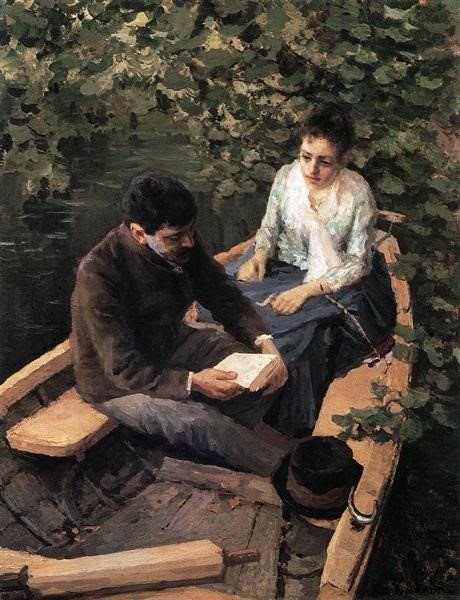|
In the Boat We were all happily surprised when our neighbor from the adjoining farm, Vladimir Ivanovich Beloglazov, knocked on our door one day, and said that his son Sergei wished to call on our eldest sister Elisabeth. Papa was against it because Elisabeth was, to be honest, a little homely, and mousy and reserved, and he thought she couldn’t handle another romantic disappointment, but Mama overruled him as usual, thinking that this might have been Elisabeth’s last chance to get a husband. Mama’s decision encouraged all of us. Until Elisabeth was married, none of the rest of us could be married. I never understood that convention, but that’s the way things were. Even though the potential beau was Sergei, a very quiet, awkward, and, we thought, a stupid, boring, and probably illiterate man, all of us agreed it was a good idea as Elisabeth deserved some kind of future outside the family. We knew she wanted to have children although she wasn’t even very good at dealing with us, her younger siblings. But she was twenty-two years old; she was running out of time. The following Saturday, Vladimir Ivanovich Beloglazov, his wife Elena Nikolaevna Beloglazova, and Sergei came to our house for dinner. Sergei didn’t talk very much. I don’t think Vladimir Ivanovich said anything except to compliment Mama on the dinner, and Elena Nikolaevna talked too much. I think she must have been nervous about this initial courting situation of her son and Elisabeth. My sisters giggled a lot, for reasons I couldn’t fathom. But it did end well. Sergei asked Mama and Papa if he could call on Elisabeth again. The next Friday, after Sergei had finished his farm work, and Elisabeth had finished knitting another jersey for the orphans in the village, Sergei came by the house for tea. Mama served them in the parlor. She stayed a few moments, whispered something to Elisabeth, then left the two of them alone. Mama shut the door and shooed us away from it, but we returned once Mama had gone. Over the next several minutes, we could hear only a few words and some indistinct sounds so we became bored and went away. Who knows what two non-conversationalists like Elisabeth and Sergei talked about for the next hour until Sergei went home. Late Tuesday night, after we were all in bed, I heard Elisabeth get up. I looked out the window and saw her walking down the road by the light of the moon toward the Beloglazov farm. She disappeared among the fir trees that lined the road. On Saturday afternoon, long before Sergei could have finished all his farm chores, he knocked on our front door. Elisabeth answered it and immediately they set off over our back fields toward the river. I could see that they didn’t exchange a single word. I didn’t understand this at all. I roused my sisters and we went outside to follow Elisabeth and Sergei. We crossed the fields and went through the woods that bordered the river. From there, we spied on them. They were sitting in our boat in the shade on the shore just down the river, anchored by our old milk urns. Elisabeth sat in the bow of the boast, looking at Sergei. Sergei was sitting in the middle of the boat, sideways to Elisabeth. He had a book in his hands. He was reading! He wasn’t even talking to Elisabeth, even though her attention on him was rapt. This was no path to romance. Oh, what a fool he was! What could he have been thinking? We made our way through the trees and shrubs and brambles down to the river’s edge. It was a mostly still day, and we could hear murmuring, but couldn’t make out what was being said. Gradually, the wind changed direction, and we could hear more clearly. The murmuring turned into words, and they were coming from Sergei. Elisabeth saw us, and nodded with the faintest of smiles. She looked back to Sergei and again seemed serious. Sergei turned to Elisabeth. He appeared apprehensive, but she smiled at him, and he seemed to relax. I think Elisabeth said, “Beautiful.” Sergei went back to his book, and we could hear him sound out the words, “Shall I compare thee to a summer’s day?” Elisabeth looked at us again, winked, then lay back in the bow of the boat with the biggest smile I had ever seen. William Kitcher William Kitcher lives in Toronto and write in many genres – literary, humour, SF, noir, non-fiction, drama. "My stories have been published on all continents except South America and Antarctica but I have some good penguin connections, so I should be able to knock Antarctica off my list very soon."
0 Comments
Your comment will be posted after it is approved.
Leave a Reply. |
The Ekphrastic Review
COOKIES/PRIVACY
This site uses cookies to deliver your best navigation experience this time and next. Continuing here means you consent to cookies. Thank you. Join us on Facebook:
July 2024
|




